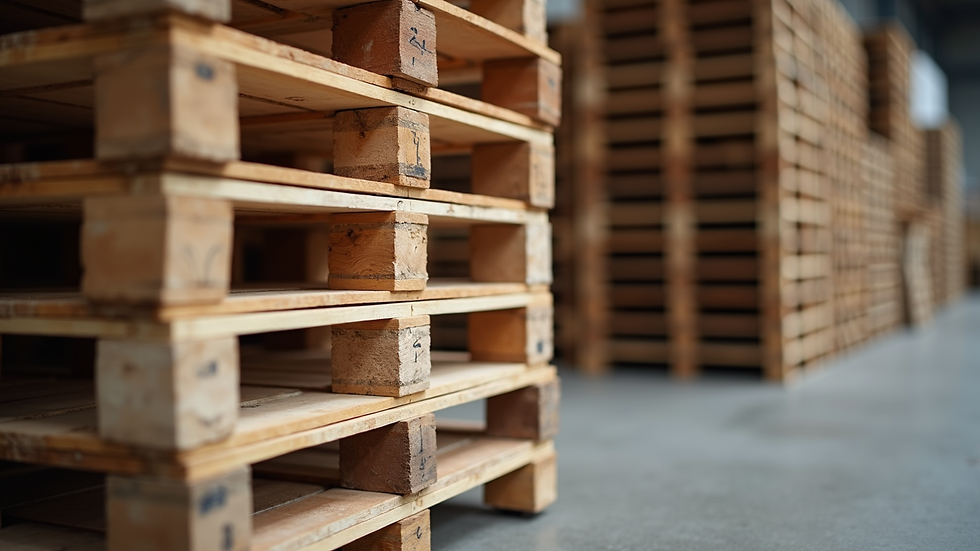Sustainable Practices for Businesses Using Wooden Pallets
- betterpalletcompan
- Aug 10, 2025
- 5 min read
In today's world, sustainability is more than just a buzzword. It is a necessity for businesses that want to thrive while being responsible stewards of the environment. One way to embrace sustainability is through the use of wooden pallets. These versatile tools can help businesses reduce waste, save money, and promote eco-friendly practices.
In this blog post, we will explore various sustainable practices for businesses using wooden pallets. We will discuss how to source, use, and repurpose these pallets effectively. By the end, you will have a clear understanding of how wooden pallets can contribute to a more sustainable business model.
Understanding Wooden Pallets
Wooden pallets are flat structures used to support goods during storage and transportation. They are typically made from hardwood or softwood and can be reused multiple times.
Using wooden pallets can significantly reduce the carbon footprint of a business. They are often made from renewable resources and can be recycled or repurposed at the end of their life cycle.
Businesses can choose between new and used pallets. New pallets are made from freshly cut wood, while used pallets are often refurbished. Choosing used pallets can save money and reduce waste.
Sourcing Sustainable Wooden Pallets
When sourcing wooden pallets, it is essential to consider sustainability. Here are some tips for sourcing pallets responsibly:
Look for certified suppliers: Choose suppliers that follow sustainable forestry practices. Certifications like FSC (Forest Stewardship Council) ensure that the wood is sourced responsibly.
Consider local suppliers: Sourcing pallets locally reduces transportation emissions. It also supports local economies.
Opt for reclaimed wood: Reclaimed wood pallets are made from salvaged materials. They are an excellent choice for businesses looking to minimize their environmental impact.
By sourcing pallets sustainably, businesses can ensure that they are contributing to a healthier planet.
Best Practices for Using Wooden Pallets
Once you have sourced your wooden pallets, it is crucial to use them effectively. Here are some best practices:
Inspect pallets regularly: Before using a pallet, check for damage. Broken or splintered pallets can pose safety risks.
Use pallets for storage: Wooden pallets can be used to create storage solutions. Stack them to create shelves or use them as bases for larger items.
Implement a pallet management system: Keep track of your pallets to ensure they are reused efficiently. This can help reduce costs and waste.
Using wooden pallets effectively can lead to significant savings and a reduced environmental impact.
Creative Ways to Repurpose Wooden Pallets
One of the most exciting aspects of wooden pallets is their versatility. Here are some creative ways to repurpose them:
Furniture: Wooden pallets can be transformed into stylish furniture pieces. Consider making coffee tables, benches, or even bed frames.
Garden Planters: Pallets can be used to create vertical gardens or planters. This is a great way to utilize space and grow your own herbs or flowers.
Art Installations: Businesses can use pallets to create unique art pieces. This not only promotes sustainability but also adds character to your space.
Repurposing wooden pallets not only reduces waste but also allows businesses to showcase their creativity.
The Economic Benefits of Using Wooden Pallets
In addition to environmental benefits, using wooden pallets can also lead to economic advantages. Here are some ways that businesses can save money:
Reduced shipping costs: Wooden pallets are lightweight and can help reduce shipping costs. This is especially true for businesses that ship large quantities of goods.
Lower disposal costs: By reusing and repurposing pallets, businesses can save on disposal fees. This can lead to significant savings over time.
Increased efficiency: Using pallets can streamline operations. They make it easier to move goods and can improve overall efficiency in the supply chain.
By understanding the economic benefits, businesses can see that sustainability and profitability can go hand in hand.
Challenges and Solutions
While there are many benefits to using wooden pallets, there are also challenges. Here are some common issues and potential solutions:
Pest infestations: Wooden pallets can sometimes harbor pests. To combat this, businesses should inspect pallets regularly and treat them if necessary.
Regulations: Some industries have strict regulations regarding pallet use. It is essential to stay informed about these regulations to ensure compliance.
Quality control: Not all pallets are created equal. Businesses should establish quality control measures to ensure that they are using safe and reliable pallets.
By addressing these challenges, businesses can maximize the benefits of using wooden pallets.
Case Studies: Successful Implementation of Wooden Pallet Practices
To illustrate the effectiveness of wooden pallets, let’s look at a few case studies of businesses that have successfully implemented sustainable practices.
Case Study 1: A Local Brewery
A local brewery decided to use reclaimed wooden pallets for their packaging. They sourced pallets from a nearby supplier and implemented a pallet return program. Customers could return their pallets for reuse, which not only reduced waste but also fostered community engagement.
As a result, the brewery saw a 30% reduction in packaging costs and received positive feedback from customers who appreciated their commitment to sustainability.
Case Study 2: A Furniture Store
A furniture store began using wooden pallets to create unique display pieces. They transformed pallets into shelving units and seating areas for customers. This not only showcased their products but also highlighted their commitment to sustainability.
The store reported an increase in foot traffic and sales, as customers were drawn to the creative displays.
These case studies demonstrate that with creativity and commitment, businesses can successfully implement sustainable practices using wooden pallets.
The Future of Wooden Pallets in Business
As sustainability becomes increasingly important, the future of wooden pallets looks bright. More businesses are recognizing the benefits of using pallets responsibly.
Innovations in pallet design and materials are also emerging. For example, some companies are exploring the use of biodegradable materials for pallets. This could further reduce the environmental impact of shipping and storage.
Additionally, the rise of e-commerce is driving demand for sustainable packaging solutions. Wooden pallets can play a significant role in this shift, offering a reliable and eco-friendly option for businesses.
Embracing Sustainability with Wooden Pallets
In conclusion, wooden pallets offer a wealth of opportunities for businesses looking to adopt sustainable practices. From sourcing responsibly to repurposing creatively, there are many ways to integrate wooden pallets into your operations.
By embracing these practices, businesses can reduce waste, save money, and contribute to a healthier planet. The journey toward sustainability may seem daunting, but with wooden pallets, it can also be rewarding.
As you consider your own business practices, think about how wooden pallets can fit into your sustainability goals. The benefits are clear, and the possibilities are endless.



Comments